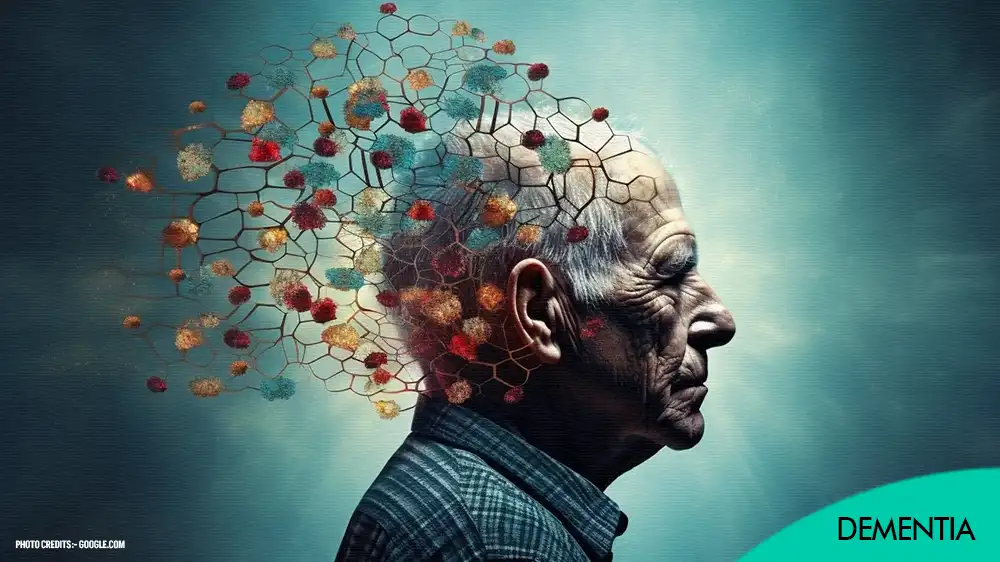
NEUROSCIENCE
Why Are Dementia Rates Rising: Symptoms, Causes and Treatment
-
Rahul Priydarss
Discover effective treatments and strategies for managing dementia symptoms and improving quality of life. From medications and therapy to lifestyle adjustments and advance care planning, learn how to navigate the challenges of dementia caregiving with support from healthcare professionals.
Introduction of Dementia:
Dementia is a term used to describe a group of symptoms related to a decline in cognitive function severe enough to interfere with daily life. It is not a specific disease but rather a collection of symptoms that can be caused by various underlying conditions.
The most common type of dementia is Alzheimer’s disease, but other types include vascular dementia, Lewy body dementia, and frontotemporal dementia, among others. Dementia typically affects older adults, although it can occur in younger individuals as well.

Table of Contents
What is Dementia:
Dementia is a syndrome characterized by a decline in cognitive function that interferes with a person’s ability to perform daily activities. It affects memory, thinking, orientation, comprehension, calculation, learning capacity, language, and judgment. Dementia is caused by various diseases and conditions that damage brain cells, impairing cognitive abilities.
Overview of Rising Dementia Rates:
Dementia rates are on a stark upward trajectory globally, posing a significant public health concern. Let’s delve deeper into the reasons behind this rise and its potential impact.
Current Situation: As of 2020, over 55 million people worldwide live with dementia, according to Alzheimer’s Disease International (ADI). That translates to someone developing dementia roughly every 3 seconds.
The Coming Surge: As we look ahead, the picture gets more concerning. ADI estimates a near doubling of cases every 20 years, reaching a staggering 139 million by 2050.
Success Story, Growing Challenge: Improved healthcare and living standards have led to people living longer lives. This is a positive development, but it also means a larger proportion of the population is reaching old age, the prime risk factor for dementia.
Not Just the Elderly: While dementia primarily affects older adults, there’s a growing awareness of younger-onset cases, particularly those below 65 years old. However, these cases still represent a smaller portion of the overall numbers.
Shifting Burden: Currently, a significant portion (around 60%) of dementia cases reside in low- and middle-income countries. However, this is expected to rise to a staggering 71% by 2050, according to ADI. Regions like China and India, with their rapidly aging populations, are likely to witness the sharpest increases.
Limited Resources: Developing countries often have weaker healthcare systems and social support structures compared to developed nations. This can make it difficult to provide adequate care for the growing number of dementia patients.
Why are Dementia Rates Rising:
There are two main reasons why dementia rates are rising globally.
Increasing Age Population: This is the biggest factor. Dementia primarily affects older adults, and as people are living longer due to better healthcare and living conditions, the number of people reaching old age is also growing. This naturally leads to a rise in dementia cases.
Survival with pre-existing conditions: Advancements in medicine have also led to people surviving longer with pre-existing conditions like heart disease and diabetes, which are risk factors for dementia. While these conditions themselves might not directly cause dementia, they can increase the vulnerability of the brain to developing it as people age.
Types of Dementia:
Dementia is an umbrella term for a group of conditions causing a decline in memory, thinking, and behavior. While Alzheimer’s disease is the most common form, several other types exist.
1. Alzheimer’s Disease
Alzheimer’s disease is the most prevalent form of dementia, characterized by progressive memory loss and cognitive decline. It typically begins with mild memory problems and gradually worsens, affecting various aspects of thinking, behavior, and personality.
2. Vascular Dementia
Vascular dementia results from impaired blood flow to the brain, often due to strokes or other conditions that damage blood vessels. Symptoms can include difficulties with memory, reasoning, and judgment, and may vary depending on the location and severity of the vascular damage.
3. Lewy Body Dementia
Lewy body dementia is caused by abnormal protein deposits called Lewy bodies in the brain. It shares symptoms with both Alzheimer’s disease and Parkinson’s disease, including cognitive impairment, movement problems, visual hallucinations, and fluctuations in alertness.
4. Frontotemporal Dementia (FTD)
Frontotemporal dementia involves damage to the frontal and temporal lobes of the brain, leading to changes in behavior, personality, and language abilities. Unlike Alzheimer’s disease, which primarily affects memory initially, FTD often presents with early changes in behavior or language.
5. Mixed Dementia
Mixed dementia occurs when a person has more than one type of dementia, such as Alzheimer’s disease and vascular dementia occurring simultaneously. This combination can result in a complex interplay of symptoms and may present diagnostic challenges.

Symptoms of Dementia:
Certainly, here are some common symptoms of dementia.
Memory Loss: One of the most noticeable symptoms of dementia is memory loss, particularly difficulty remembering recent events, appointments, or familiar information. This memory impairment may progressively worsen over time.
Difficulty with Language: People with dementia often experience difficulties with language, such as finding the right words, following a conversation, or understanding written or spoken information. They may also have trouble expressing themselves coherently.
Impaired Judgment and Reasoning: Dementia can affect a person’s ability to make sound judgments and decisions. They may struggle to assess risks or understand the consequences of their actions, leading to poor decision-making.
Disorientation and Confusion: Individuals with dementia may become disoriented or confused about time, place, or person. They may lose track of dates, seasons, or their location, and may have trouble recognizing familiar faces or places.
Difficulty Performing Familiar Tasks: Tasks that were once routine and familiar may become challenging for people with dementia. This can include activities such as cooking, managing finances, or following a familiar route while driving.
Changes in Mood or Behavior: Dementia can lead to changes in mood or behavior, such as increased agitation, irritability, anxiety, or depression. Some individuals may become apathetic or withdrawn, while others may exhibit socially inappropriate behaviors.
Loss of Initiative: People with dementia may lose interest in activities they once enjoyed and may have difficulty initiating activities or conversations. They may also appear apathetic or indifferent to their surroundings.
Difficulty with Motor Skills: In later stages of dementia, individuals may experience difficulty with motor skills, including coordination, balance, and walking. They may become unsteady on their feet and have an increased risk of falls.
Personality Changes: Dementia can cause changes in personality and mood. Individuals may exhibit uncharacteristic behaviors, become more suspicious, and paranoid, or exhibit socially inappropriate behavior.
Decline in Cognitive Abilities: Overall, dementia results in a decline in cognitive abilities, including memory, attention, concentration, and problem-solving skills. This decline is progressive and tends to worsen over time.
Treatment options for Dementia:
There is currently no cure for dementia, but there are treatment options available that can help manage symptoms and improve the quality of life for patients. Here’s an overview of the different approaches.
Medications:
Acetylcholinesterase inhibitors: These medications (donepezil, rivastigmine, galantamine) work by increasing levels of a brain chemical called acetylcholine, which is important for memory and thinking. They may be helpful for mild to moderate Alzheimer’s disease and some other forms of dementia.
Memantine: This medication works by regulating another brain chemical called glutamate. It may be used for moderate to severe Alzheimer’s disease and some other dementias, sometimes in combination with cholinesterase inhibitors.
Other medications: Depending on the specific symptoms a person experiences, doctors may prescribe antidepressants, anti-anxiety medications, or antipsychotics to manage mood swings, agitation, or hallucinations.
Therapies:
Cognitive stimulation therapy: This therapy involves activities designed to keep the mind active and engaged, potentially slowing cognitive decline.
Music therapy: Music can be a powerful tool for relaxation, improving mood, and evoking memories in dementia patients.
Occupational therapy: This therapy helps patients with daily living activities like dressing, bathing, and eating, promoting independence for as long as possible.
Psychotherapy: Individual or group therapy can help patients with dementia and their caregivers cope with the emotional challenges of the disease.
Lifestyle Strategies:
Maintaining a healthy lifestyle: Regular exercise, a balanced diet, and good sleep hygiene are crucial for overall health and may contribute to managing dementia symptoms.
Social engagement: Staying socially connected can help stimulate the mind and combat feelings of isolation.
Cognitive exercises: Puzzles, brain teasers, and other activities that challenge the mind may help maintain cognitive function.
Risk factors of Dementia:
Certainly, here are some common risk factors associated with dementia.
Age: Advancing age is the greatest risk factor for dementia. While dementia can affect individuals of any age, the risk increases significantly as people get older.
Genetics and Family History: Certain genetic factors can increase the risk of developing dementia. Having a family history of dementia, especially if a close relative such as a parent or sibling has been diagnosed, can also elevate the risk.
Cardiovascular Health: Conditions that affect the heart and blood vessels, such as high blood pressure, high cholesterol, diabetes, and obesity, can increase the risk of developing vascular dementia. Maintaining a healthy cardiovascular system through regular exercise, a balanced diet, and managing these conditions can help reduce the risk.
Lifestyle Factors: Certain lifestyle choices and habits can impact dementia risk. These include smoking, excessive alcohol consumption, a sedentary lifestyle with little physical activity, and a poor diet high in saturated fats and refined sugars.
Head Injuries: A history of significant head injuries, particularly those resulting in loss of consciousness or concussion, may increase the risk of developing dementia later in life.
Mental and Social Engagement: Engaging in mentally stimulating activities such as reading, puzzles, socializing, and lifelong learning may help maintain cognitive function and reduce the risk of dementia.
Depression and Social Isolation: Depression and social isolation have been linked to an increased risk of dementia. Maintaining mental health through social connections, seeking treatment for depression when needed, and staying socially engaged may help lower the risk.
FAQs about Dementia:
A1: Early signs of dementia may include memory loss, difficulty completing familiar tasks, confusion, and changes in mood or behavior.
A2: While there is no sure way to prevent dementia, adopting a healthy lifestyle that includes regular exercise, a balanced diet, and social engagement can help reduce the risk.
A3: While genetics can influence the risk of developing dementia, lifestyle factors and environmental influences also play significant roles in its development.
A4: Dementia is typically diagnosed through a combination of medical history, physical examination, cognitive testing, and laboratory tests to rule out other possible causes of symptoms.
A5: Caregiver support services, including education, respite care, and support groups, are available to help caregivers cope with the challenges of caring for a loved one with dementia.
-Please remember, to always consult with healthcare professionals or Doctors for personalized advice related to medical conditions.
Conclusion:
In summary, while dementia poses significant hurdles, a range of treatments and strategies exist to alleviate symptoms and enhance quality of life. From medication to supportive therapies like cognitive stimulation and occupational therapy, a holistic approach can make a difference. Behavior management techniques, supportive services, and lifestyle adjustments are also crucial for managing challenges.




